#ask-discworld-death
Note
! DO YOU LIKE CATS
i have develøped a føndness.
2 notes
·
View notes
Note
Can Death (from Discworld) kill Macbeth?
Yes, Death from Terry Pratchett's Discworld series could kill Macbeth!
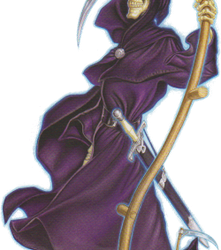
In regards to the Gender Clause, it gets a bit complicated, as Death seems to generally be alright with masculine terms and he/him pronouns, though Death's gender identity is wildly different across different translations. This is mainly due to the fact that these languages will have inherit genders tied to different concepts, and in many of these, death is often referred to with feminine pronouns, and so there's a bit of confusion there. (Apparently, the Czech translation deals with this by making his name a non-existent masculine equivalent to their feminine word for death.) For now, we'll be leaving Death off of the Gender Clause, but that is not to say that there's no ground for discussion on that front, of course.
As for the Unconventional Birth Clause and Birth Parent Clause, Discworld's Death is very much a primordial entity- perhaps more accurately, a primordial concept- and thus was never exactly born, and certainly not of a woman. The character of Death has always been and always will be, similar to the concept of death itself. So, Death applies for both UBC and BPC!
As for whether or not Death counts as a Unique Exception, I'm leaning a bit more strongly towards no. There is a case to be made, of course, that Macbeth dying in any way would be Death killing him, but in the Discworld books, Death as a character seems to be very heavily discouraged from meddling in mortal affairs and killing anyone directly. Instead, he acts more as someone who comes to take you away after you have already died. Now, Discworld's Death does seem to be a transdimensional entity, and this whole thing of being "discouraged from directly meddling in mortal affairs" may very well be a rule he must only abide by within Discworld, and he would be free to kill as he pleased in a different universe (say, one with Macbeth in it). But either way, we've already confirmed Death's ability to kill Macbeth through UBC and BPC, and considering that, these explanations feel like a bit too much of a stretch for me, so I won't be categorizing Death as a Unique Exception.
Thank you for your submission! (And big thanks to my mom for helping me out with this one!)
169 notes
·
View notes
Text
My absolute favourite 'Wow. You missed the point of this so much that I'm actually impressed how much you missed the point by' that I've encountered recently is someone claiming the ending of Hogfather is grimdark.
#discworld#hogfather#terry pratchett#the argument appeared to be that Death's line about 'SHOW ME ONE ATOM OF JUSTICE ONE MOLECULE OF MERCY' was inherently grimdark#which again#tell me you missed the point without explicitly telling me you missed the point#I honestly don't know how you read a book/watch a miniseries with that scene with the Little Match Girl#and go away with the idea of 'this is a story that says nothing matters and justice and mercy are meaningless'#said person then accused people explaining why they were wrong to them of 'gatekeeping' which#if asking that you actually engage with the text you are reading is gatekeeping then that word has truly lost all meaning#like if people were telling them to read another Pratchett book I'd maybe get it#but no they were essentially asking them to read *the rest of the scene*
365 notes
·
View notes
Note
#doctor who#donna noble#i do wonder....would Donna have become a witch in the Discworld universe?
YES SHE WOULD. She would be an incredible witch in Discworld!!!
Ah so I'm not alone in this! Yay!
Also: imagine Ten Vs Grandma Weatherwax 😈.(they don't disagree, exactly.They're just territorial.Like cats.)
He probably would get along with Death, though.
#discworld#gnu terry pratchett#doctor who#donna noble#granny weatherwax#discworld witches#discworld death#tenth doctor#ask
43 notes
·
View notes
Note
book ask...16 & 36???
16. Favorite Trilogy
I was torn between Farseer and Broken Earth, but I will go with Broken Earth by N. K. Jemisin, I think it's one of the best things I've read
36. Your absolute most favorite character(s) from any book you have ever read.
THE MAN THE MYTH THE LEGEND FITZCHIVALRY FARSEER HIMSELF
Genuinely no other character has made me as insane as him, I care about Fitz to an embarrasing degree and he's become a core part of my personality. He's me and I'm him
#asks#thank you!#wigglygoblin#honorary mention to: vin mistborn + ciri from the witcher + beloved rote + death discworld + tenar earthsea :)
4 notes
·
View notes
Note
The track, "Mystic Eyes Awakening', from Tsukihime remake, for Ruby's 'rebirth'.
And truly showing just how weeb I truly am. XD
[YT: /watch?v=i1z8V_gtJvg ]
So, funny story:
Back in Volume 4 prior to Qrow explaining the backstory of the Two Brothers when all we knew about Remnant's divines was that they were polytheistic, I had a theory/hope that Remnant had a full-blown pantheon of several different gods.
And working off of both Ruby's numerous death-allusions and Salem's cryptic warning to Cinder that she was 'more vulnerable than ever' to Ruby now that she had maiden powers (since we didn't know about her Grimm arm yet), I came up with a theory that the Silver Eyes originated from Remnant's God of Death. And were going to turn out to not just be Anti-Grimm, but effectively Anti-everything, being essentially the eyes of Death itself.
And the main reference I was using for what this might functionally look like was, you guessed it, the Mystic Eyes of Death Perception XD
Though admittedly, I was using Kara no Kyoukai as the reference rather than Tsukihime lol
#rwby#rwby ask#blue scorpion king ask#Ruby Rose#rwby silver eyes#kara no kyoukai#old rwby theory#also i had an idea where rwby's Death showed up and their basically the death from discworld and ruby gets along great with them XD
13 notes
·
View notes
Photo
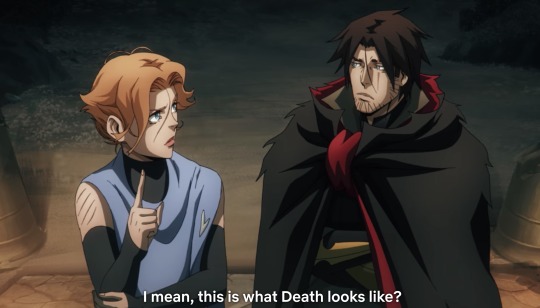

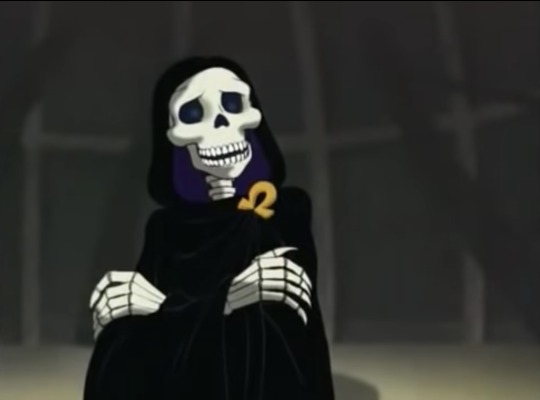
Season 4, but it’s Terry Pratchett’s Death instead.
I wouldn’t call him ‘nicer,’ but he’s the most wholesome Death I can think of. At the very least, he’d probably be mildly annoyed by the attempts to bring Dracula back instead of actively supporting them.
#castlevania#discworldseries#soul music#castlevania sypha#discworld death#castlevania death#castlevania netflix#sypha belnades#trevor belmont#death#the grim reaper#terry pratchett#discworld meme#castlevania meme#shitpost#yes i know it's not the same world#this is what death looks like?#because I was hoping for something nicer#ask and you shall receive
47 notes
·
View notes
Note
🌻
Last night I watched Wyrd Sisters 1997 and I was so enchanted by Death's appearances.
He's truly my number one guy for all time.
He get's stage fright. Death!
He gets sulky when the king says he doesn't like cats.
I love him so much.
send me a 🌻 and ill just tell you whatever the fuck i want
#anon#replies#ask meme#wyrd sisters 1997#discworld#gnu terry pratchett#death from discworld#words from alice#novels
3 notes
·
View notes
Note
what's your favourite discworld book
it’s probably mort at the moment ajsjdjdd I loved mort’s mini corruption arc
#asks#im care he#also death is such a fun character!!#what is YOUR favourite discworld book tumblr user cake-my-beloved?? /gen
7 notes
·
View notes
Text
Rincewind cameo in Mort my beloved
#so good to see my absolute mess of a boy again#i cant work out if its pre or post colour of magic#i like to think post just because being asked if hed seen death recently probably sent him into a spiral#discworld
3 notes
·
View notes
Note
for the ask game: DEATH
Probably a cat. While he isn't really built to be empathetic, he's doing his best and is really quite endearing in the process.
3 notes
·
View notes
Note
"It's not fair!" "NO, IT IS NOT." "Then fix it, Father!"
"I get the feeling this is one of those 'life is unfair' things that the father can't fix himself," Alice comments, observing.
"Yes, but. . ." Victor worries his lower lip. "There's something about the way the dad talks that -- really w-worries me. . ."
#~M: I want some questions! now! (ask)#~M: grin without a cat (anon)#~V: Cuddlepile#~T: Girls Love Girls And Boys#not fair fix it#~C: Victor Van Dort#~C: Alice Liddell#((judging by the way the lines are typed I'm guessing this is a Discworld quote#probably from Mort given as far as I recall only one person calls Death 'Father'#but yeah#understandable in that case why Victor's getting the heebiejeebies))#~M: with this hand I will lift your queue
1 note
·
View note
Note
Would Rincewind from Discworld survive Castle Dracula?
I've got multiple asks apiece for Sam Vimes and Moist von Lipwig, but HECK YES I wanna talk about Rincewind!
If Rincewind knows one thing, it's when to run away from a bad situation. The Dead travel fast but Rincewind is faster. Rincewind does not want to be here. Nobody nopes like him. At the very first red flag Rincewind is RinceOUT.
...unfortunately Fate hates him. Inevitably, he ends up sheltering for the night... at Castle Dracula.
(Re: the crucifix, "for your mother's sake" is unlikely to move him, since she ran away before he was born. But Rincewind doesn't shave - he needs his beard, he has too little as it is!)
Rincewind is a coward by birth, upbringing and vocation. He is pretty good at convincing people not to kill him and he usually looks too pathetic to be worth the bother. He is not at all good at convincing people not to force him into heroic roles that he absolutely does not want. But staying alive is pretty much his speciality.
Rincewind is afraid of perfectly ordinary women - he is terrified of the Girlies, and is just as good at running from them screaming as Jonathan is. Better, arguably. I don't think anyone has ever said "I too can love" about him though, and I don't think anyone is going to. Dracula may not rescue him from the Girlies ... but he gets lucky and escapes them somehow.
Fate may hate him, but the Lady think he's her specialist little guy. Rincewind's luck is extraordinary.
And that's the clincher for me. Rincewind is Fate's chewtoy and DEATH's hobby, but he is the champion of an actual literal god, and She is going to pull him through kicking and screaming.
For anyone asking why he doesn't try magic, magic is not going to help him because he's real bad at it. Dracula is an objectively better wizard than he is, and I honestly don't know how this informs their relationship.
...oh man if Dracula takes his hat he's gonna be so mad. So mad.
His one biggest hurdle is going to be the wall due to his crippling fear of grounds. But I think the Lady will have his back on this one, so when he accidentally trips and falls out the window he'll have no choice but to climb. He'll hate ever second of it. But once he makes it down, the Jon-a-Thon is precisely what he's best at.
I sadly don't think Dracula's library is extensive enough to allow him to access L-space.
I do think Rincewind would try to fight Dracula with a half-brick in a sock over the baby steal. Rincewind loves kids and gets occasional bouts of heroism in spite if himself. But the door is locked and he can't get out of his room.
I am fudging this a bit, but I do not believe the Lady will let him die if it can be avoided through sheer dumb luck. And so therefore Rincewind the Wizzard can survive Castle Dracula, but would vastly prefer not to have to
2K notes
·
View notes
Text
The Oz-Vetinari well runs so deep. Vicious older woman mentor/enemy (Fish || Margolotta and to a lesser extent Lady Meserole). Raised by single older female relative. Bizarre tension with local idealistic policeman (complicated by Gordon and Vimes moving in opposite directions). Bullied at school. Crime licensing. Lawful evil stability over all. Personal egalitarian belief that everyone else should be equal and subordinate to them. Collaboration with oligarchs through intimidation. The Prince. Constantly subject to assassination plots. So obviously manipulative that it obscures the actual manipulation. The art of camouflage. Obsessed with beloved ugly dog. Sexually ambiguous and heavily asexual-coded by writers who do not know what that word means. Funny bird metaphors (Penguin/predatory flamingo). Embodies both civic progress through a revolutionary past and the heavy hand of the establishment in the present. Spare the lives of enemies for their own personal use. Most importantly: My Mom says Penguin reminds her of Vetinari (:
#kelsey liveblogs gotham#kelsey liveblogs discworld#underrated Vetinari thing is him canonically imposing the death penalty for white collar crime#they’re two facets of the old Prince archetype yet they’ve got such specific similarities (eg the dog)#Vetinari is the ‘good’ manifestation while Oz is the ‘human’ manifestation and neither are specifically evil#while also being bad people themselves#Oz asking Falcone to spare Gordon || Vetinari carrying out Meserole’s orders to spare Keel#also Oswald Cobblepot [handshake] Havelock Vetinari#just the WORST names.
1 note
·
View note
Text
okay I watched good omens s2 yesterday with my partner, and I was genuinely very surprised -- I think if you've grown up through superwholock/merlin/the 100/teen wolf type shows where (with the exception periodically of doctor who) you kind of had to make up the good show that something could have been in your head, that colours a lot of your viewing, and to be honest I thought season 1 of good omens was a fine little piece, honoured the book while modernising it somewhat, it was a nice, fun, low stakes time, with a couple of things I might have wanted a tad different but nothing overall awful.
so I was seeing all this meta and gifsets and discussion, while I was waiting to give s2 a watch with my partner and thought "ah, people have made up the good show in their heads again" not that I assumed s2 was going to be a bad show, but that people were taking extra deep plunges into possibilities, the way fandom does, and that was fine. I knew there was a big ol kiss, I had a sense of some kind of argument at the end, and that it was setting up a s3
I also knew that mainstream reviews were calling it (politely) self-indulgent and dependent on whether or not you enjoy david tennant and michael sheen having a good time for just under 6 hours
all in all, expectations of a somewhat mainstream show without too much to think about, a nice, fun low stakes time, moving on...
(EDIT: AND THEN I WROTE A LOT OF WORDS SO YOU CAN IMAGINE THAT MY REACTION WAS QUITE DIFFERENT)
as it turns out it seems these things that were being written on tumblr were discussing the actual text of the show and not things you could extrapolate if you squinted and tilted your head a little to the left as I'm so used to doing, so in fact there is much to think about!
and my first thought was "this is like when you read early discworld books that ask a question like a joke, only to find that over time the answer to that question becomes very serious (and also can be funny at times of course)." how terry pratchett would pick and pick at tropes and notions and social ideas and go "oh now hold on, this seems strange..." starting way back when he thought it was odd that women warriors always seemed to be dressed in metal bikinis and then realising he hadn't done a good enough job of subverting the trope, simply by depicting it and calling it a bit silly
why do goblins always get treated as the villains? what's with this divine succession of kings business? where are the female dwarfs? who do we treat as disposable?
good omens season one went: "haha what if heaven and hell were intensely incapable, bureaucratic, corrupt, and uncaring of the work they did, and we took an angel and a demon and had them actually care? wouldn't that be... a bit silly?" (and it was)
good omens season two went: "what are the consequences for caring when the people who have power over you are incapable, bureaucratic, corrupt, and uncaring? what are the forces that supersede systems built on fear, ignorance, and violent conformity? can people change and break out of/challenge/break down these structures by caring?"
and this was set up with a neat little sleight of hand (to reference aziraphale's switch-and-bait in the episode with the nazi zombies), because the majority of season 2 does feel a bit indulgent: hey, remember those two wacky angel-and-demon characters? watch some more wacky things they did through the ages, watch them take a sojourn through 1827 Edinburgh and do a magic show during the Blitz, and... stop the death of Job's and Sitis' children (actually maybe that whole segment ought to have been what they call "A Clue")
see them try to figure out a kooky mystery, all the while setting up a cute little same-gender romance on their street. watch as everything points towards a happy ending that's all about the two of them realising what they've been to one another all these thousands and thousands (and thousands and thousands) of years- but hold on. lest we forget - and the show has made this point over and over - there are powerful people who control them, who hurt them, and who plan on hurting others, throughout the whole season, and as it turns out they know what they've been to one another for far far longer, and know how to pull their strings...
season 2 then, has to show us these things, not because they're indulgent (well, maybe occasionally, but the apology dance is still important), but because in order to make the ending a tragedy, we first need to understand, properly, the impact that they have had on each other. we need to understand that Aziraphale relied heavily on Crowley to be his moral compass and leaned on black-and-white thinking in order to deal with things, because if it's all grey then where does he fit and what has it all meant and heaven has to be the good guys, even as Job's and Sitis' children are ordered to be killed, it's all he ever had...
and Crowley was always an anchor, needed to trust that Aziraphale was different, needed to bend to every whim that Aziraphale has, because otherwise what's his worth in all this? After having been already deemed worthless by the heaven that Aziraphale needs to believe in?
and that, simplistically described, is the narrative that we're seeing in s2, and alongside that the ways that the changes they have upon each other are noticed, and monitored, and placed under suspicion, and finally... broken up, not by the clumsy, brute force that's been attempted over and over again, but by a promise to return into a violent, controlling system and to "make it better from within"
and all of this is wrapped up in two queer relationships + a third queered-within-the-text relationship that creates the inverse of how it ends for Aziraphale and Crowley (so far). queer love -- whatever shape that has -- is explicitly the shape of non-conformity within this narrative, including within the symbolism of angel-and-demon love of Gabriel and Beelzebub, which in the context of the systems created is considered queer (and one can argue till the cats come home about casting cis actors, about angel-and-demon notions of gender/romance/sexuality, but the "queerness" comes from building something non-conforming to the systems they exist in), and enforced by the explicitly our-world-definition-of queer romance that Nina and Maggie have going on (which, while less high stakes, still contains the background controlling relationship that Nina initially is in)
all of this to say, that I disagree that s2 meanders, or that plotlines happen for the sake of showcasing Aziraphale and Crowley without purpose, or that characters get sidelined (I'd say it sets up a whole host of interesting characters to further get into actually), or that it's strictly mainstream easy-access narrative that's just an excuse for the main creators and actors to get back together.
the love is the point, and this show takes its time to show the love (and the unequal boundary-setting, and the fact that one of them has an undiscussed tragic backstory, and the desperation to belong again, and the fear instilled by oppressive systems, and and and), so that we understand why those last 15 minutes happen the way that they do
it's sleight of hand, and like all good magic, you don't notice until it's happened
1K notes
·
View notes
Text
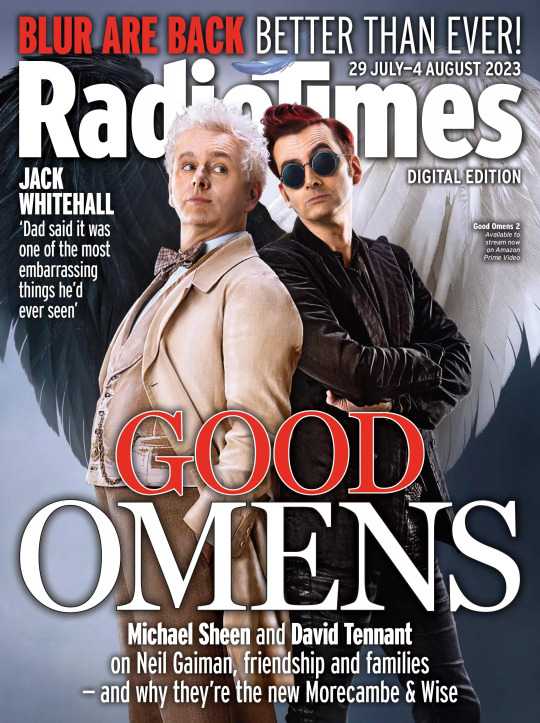
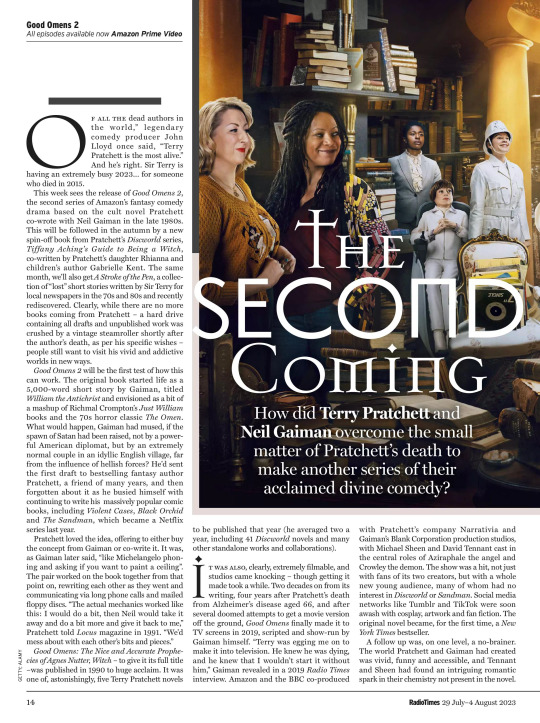
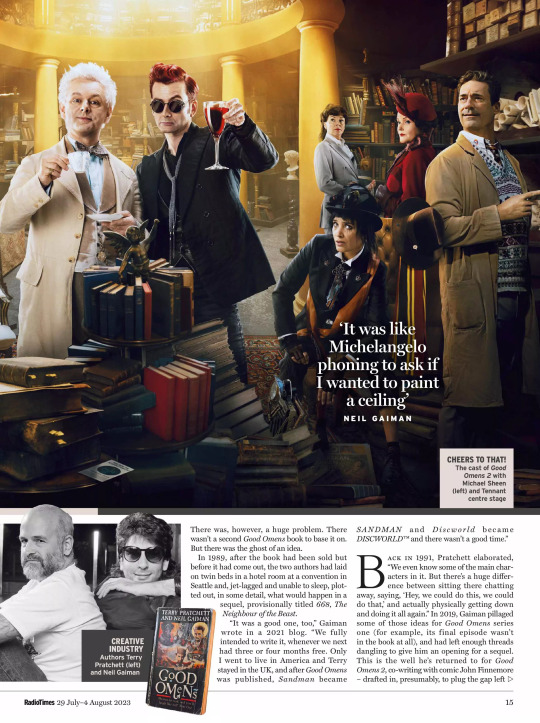
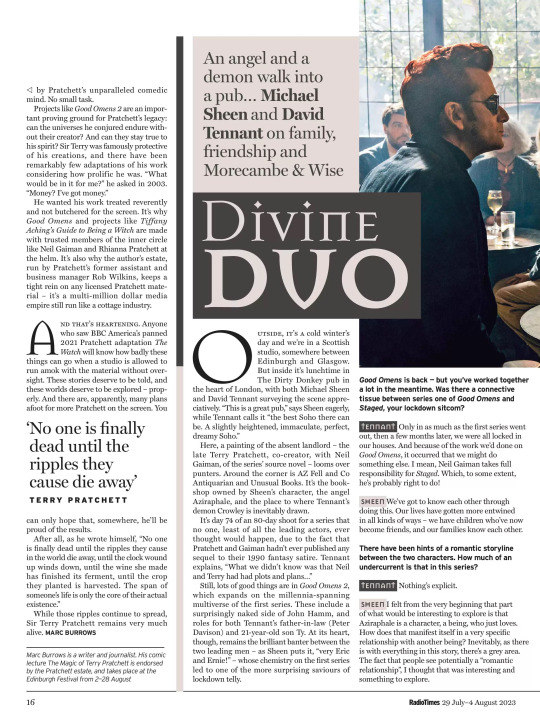
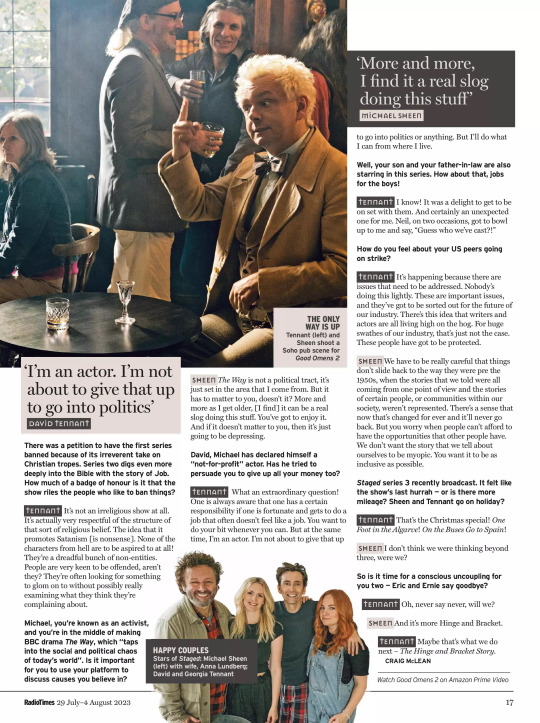
The Radio Times magazine from the 29 July-04 August 2023 :)
THE SECOND COMING
How did Terry Pratchett and Neil gaiman overcome the small matter of Pratchett's death to make another series of their acclaimed divine comedy?
For all the dead authors in the world,” legendary comedy producer John Lloyd once said, “Terry Pratchett is the most alive.” And he’s right. Sir Terry is having an extremely busy 2023… for someone who died in 2015.
This week sees the release of Good Omens 2, the second series of Amazon’s fantasy comedy drama based on the cult novel Pratchett co-wrote with Neil Gaiman in the late 1980s. This will be followed in the autumn by a new spin-off book from Pratchett’s Discworld series, Tiffany Aching’s Guide to Being a Witch, co-written by Pratchett’s daughter Rhianna and children’s author Gabrielle Kent. The same month, we’ll also get A Stroke of the Pen, a collection of “lost” short stories written by Sir Terry for local newspapers in the 70s and 80s and recently rediscovered. Clearly, while there are no more books coming from Pratchett – a hard drive containing all drafts and unpublished work was crushed by a vintage steamroller shortly after the author’s death, as per his specific wishes – people still want to visit his vivid and addictive worlds in new ways.
Good Omens 2 will be the first test of how this can work. The original book started life as a 5,000-word short story by Gaiman, titled William the Antichrist and envisioned as a bit of a mashup of Richmal Crompton’s Just William books and the 70s horror classic The Omen. What would happen, Gaiman had mused, if the spawn of Satan had been raised, not by a powerful American diplomat, but by an extremely normal couple in an idyllic English village, far from the influence of hellish forces? He’d sent the first draft to bestselling fantasy author Pratchett, a friend of many years, and then forgotten about it as he busied himself with continuing to write his massively popular comic books, including Violent Cases, Black Orchid and The Sandman, which became a Netflix series last year.
Pratchett loved the idea, offering to either buy the concept from Gaiman or co-write it. It was, as Gaiman later said, “like Michelangelo phoning and asking if you want to paint a ceiling” The pair worked on the book together from that point on, rewriting each other as they went and communicating via long phone calls and mailed floppy discs. “The actual mechanics worked like this: I would do a bit, then Neil would take it away and do a bit more and give it back to me,” Pratchett told Locus magazine in 1991. “We’d mess about with each other’s bits and pieces.”
Good Omens: The Nice and Accurate Prophecies of Agnes Nutter, Witch – to give it its full title –was published in 1990 to huge acclaim. It was one of, astonishingly, five Terry Pratchett novels to be published that year (he averaged two a year, including 41 Discworld novels and many other standalone works and collaborations).
It was also, clearly, extremely filmable, and studios came knocking — though getting it made took a while. rnvo decades on from its writing, four years after Pratchett's death from Alzheimer's disease aged 66, and after several doomed attempts to get a movie version off the ground, Good Omens finally made it to TV screens in 2019, scripted and show-run by Gaiman himself. "Terry was egging me on to make it into television. He knew he was dying, and he knew that I wouldn't start it without him," Gaiman revealed in a 2019 Radio Times interview. Amazon and the BBC co-produced with Pratchett's company Narrativia and Gaiman's Blank Corporation production studios, with Michael Sheen and David Tennant cast in the central roles of Aziraphale the angel and Crowley the demon. The show was a hit, not just with fans of its two creators, but with a whole new young audience, many of whom had no interest in Discworld or Sandman. Social media networks like Tumblr and TikTok were soon awash with cosplay, artwork and fan fiction. The original novel became, for the first time, a New York Times bestseller.
A follow up was, on one level, a no-brainer. The world Pratchett and Gaiman had created was vivid, funny and accessible, and Tennant and Sheen had found an intriguing romantic spark in their chemistry not present in the novel.
There was, however, a huge problem. There wasn't a second Good Omens book to base it on. But there was the ghost of an idea.
In 1989, after the book had been sold but before it had come out, the two authors had laid on fivin beds in a hotel room at a convention in Seattle and, jet-lagged and unable to sleep, plotted out, in some detail, what would happen in a sequel, provisionally titled 668, The II Neighbour of the Beast.
"It was a good one, too" Gaiman wrote in a 2021 blog. "We fully intended to write it, whenever we next had three or four months free. Only I went to live in America and Terry stayed in the UK, and after Good Omens was published, Sandman became SANDMAN and Discworld became DISCWORLD(TM) and there wasn't a good time."
Back in 1991, Pratchett elaborated, "We even know some of the main characters in it. But there's a huge difference between sitting there chatting away, saying, 'Hey, we could do this, we could do that,' and actually physically getting down and doing it all again." In 2019, Gaiman pillaged some of those ideas for Good Omens series one (for example, its final episode wasn't in the book at all), and had left enough threads dangling to give him an opening for a sequel. This is the well he's returned to for Good Omens 2, co-writing with comic John Finnemore - drafted in, presumably, to plug the gap left Pratchett's unparalleled comedic mind. No small task.
Projects like Good Omens 2 are an important proving ground for Pratchett's legacy: can the universes he conjured endure without their creator? And can they stay true to his spirit? Sir Terry was famously protective of his creations, and there have been remarkably few adaptations of his work considering how prolific he was. "What would be in it for me?" he asked in 2003. "Money? I've got money."
He wanted his work treated reverently and not butchered for the screen. It's why Good Omens and projects like Tiffany Aching's Guide to Being a Witch are made with trusted members of the inner circle like Neil Gaiman and Rhianna Pratchett at the helm. It's also why the author's estate, run by Pratchett's former assistant and business manager Rob Wilkins, keeps a tight rein on any licensed Pratchett material — it's a multi-million dollar media empire still run like a cottage industry.
And that's heartening. Anyone who saw BBC America's panned 2021 Pratchett adaptation The Watch will know how badly these things can go when a studio is allowed to run amok with the material without oversight. These stories deserve to be told, and these worlds deserve to be explored — properly. And there are, apparently, many plans afoot for more Pratchett on the screen. You can only hope that, somewhere, he'll be proud of the results.
After all, as he wrote himself, "No one is finally dead until the ripples they cause in the world die away, until the clock wound up winds down, until the wine she made has finished its ferment, until the crop they planted is harvested. The span of someone's life is only the core of their actual existence."
While those ripples continue to spread, Sir Terry Pratchett remains very much alive. MARC BURROWS
DIVINE DUO
An angel and a demon walk into a pub... Michael Sheen and David Tennant on family, friendship and Morecambe & Wise
Outside it's cold winter's day and we're in a Scottish studio, somewhere between Edinburgh and Glasgow. But inside it's lunchtime in The Dirty Donkey pub in the heart of London, with both Michael Sheen and David Tennant surveying the scene appreciatively. "This is a great pub," says Sheen eagerly, while Tennant calls it "the best Soho there can be. A slightly heightened, immaculate, perfect, dreamy Soho."
Here, a painting of the absent landlord — the late Terry Pratchett, co-creator, with Neil Gaiman, of the series' source novel — looms over punters. Around the corner is AZ Fell and Co Antiquarian and Unusual Books. It's the bookshop owned by Sheen's character, the angel Aziraphale, and the place to where Tennant's demon Crowley is inevitably drawn.
It's day 74 of an 80-day shoot for a series that no one, least of all the leading actors, ever thought would happen, due to the fact that Pratchett and Gaiman hadn't ever published any sequel to their 1990 fantasy satire. Tennant explains, "What we didn't know was that Neil and Terry had had plots and plans..."
Still, lots of good things are in Good Omens 2, which expands on the millennia-spanning multiverse of the first series. These include a surprisingly naked side of John Hamm, and roles for both Tennant's father-in-law (Peter Davison) and 21-year-old son Ty. At its heart, though, remains the brilliant banter between the two leading men — as Sheen puts it, "very Eric and Ernie !" — whose chemistry on the first series led to one of the more surprising saviours of lockdown telly.
Good Omens is back — but you've worked together a lot in the meantime. Was there a connective tissue between series one of Good Omens and Staged, your lockdown sitcom?
David: Only in as much as the first series went out, then a few months later, we were all locked in our houses. And because of the work we'd done on Good Omens, it occurred that we might do something else. I mean, Neil Gaiman takes full responsibility for Staged. Which, to some extent, he's probably right to do!
Michael: We've got to know each other through doing this. Our lives have gotten more entwined in all kinds of ways — we have children who've now become friends, and our families know each other.
There have been hints of a romantic storyline between the two characters. How much of an undercurrent is that in this series.
David: Nothing's explicit.
Michael: I felt from the very beginning that part of what would be interesting to explore is that Aziraphale is a character, a being, who just loves. How does that manifest itself in a very specific relationship with another being? Inevitably, as there is with everything in this story, there's a grey area. The fact that people see potentially a "romantic relationship", I thought that was interesting and something to explore.
There was a petition to have the first series banned because of its irreverent take on Christian tropes. Series two digs even more deeply into the Bible with the story of Job. How much of a badge of honour is it that the show riles the people who like to ban things?
David: It's not an irreligious show at all. It's actually very respectful of the structure of that sort of religious belief. The idea that it promotes Satanism [is nonsense]. None of the characters from hell are to be aspired to at all! They're a dreadful bunch of non-entities. People are very keen to be offended, aren't they? They're often looking for something to glom on to without possibly really examining what they think they're complaining about.
Michael, you're known as an activist, and you're in the middle of Making BBC drama The Way, which "taps into the social and political chaos of today's world". Is it important for you to use your plaform to discuss causes you believe in?
Michael: The Way is not a political tract, it's just set in the area that I come from. But it has to matter to you, doesn't it? More and more as I get older, [I find] it can be a real slog doing this stuff. You've got to enjoy it. And if it doesn't matter to you, then it's just going to be depressing.
David, Michael has declared himself a "not-for-profit" actor. Has he tried to persuade you to give up all your money too?
David: What an extraordinary question! One is always aware that one has a certain responsibility if one is fortunate and gets to do a job that often doesn't feel like a job. You want to do your bit whenever you can. But at the same time, I'm an actor. I'm not about to give that up to go into politics or anything. But I'll do what I can from where I live.
Well, your son and your father-in-law are also starring in this series. How about that, jobs for the boys!
David: I know! It was a delight to get to be on set with them. And certainly an unexpected one for me. Neil, on two occasions, got to bowl up to me and say, "Guess who we've cast?!"
How do you feel about your US peers going on strike?
David: It's happening because there are issues that need to be addressed. Nobody's doing this lightly. These are important issues, and they've got to be sorted out for the future of our industry. There's this idea that writers and actors are all living high on the hog. For huge swathes of our industry, that's just not the case. These people have got to be protected.
Michael: We have to be really careful that things don't slide back to the way they were pre the 1950s, when the stories that we told were all coming from one point of view and the stories of certain people, or communities within our society, weren't represented. There's a sense that now that's changed for ever and it'll never go back. But you worry when people can't afford to have the opportunities that other people have. We don't want the story that we tell about ourselves to be myopic. You want it to be as inclusive as possible
Staged series 3 recently broadcast. It felt like the show's last hurrah — or is there more mileage? Sheen and Tennant go on holiday?
David: That's the Christmas special! One Foot in the Algarve! On the Buses Go to Spain!
Michael: I don't think we were thinking beyond three, were we?
So is it time for a conscious uncoupling for you two — Eric and Ernie say goodbye?
David: Oh, never say never, will we?
Michael: And it's more Hinge and Bracket.
David: Maybe that's what we do next — The Hinge and Bracket Story. CRAIG McLEAN
#good omens#gos2#season 2#radio times#radio times 2023#interview#magazines#neil gaiman#terry pratchett#david tennant#michael sheen#david interview#michael interview#neil interview#terry interview#bts#fun fact#staged#the way#s2 interview#transcripts
884 notes
·
View notes